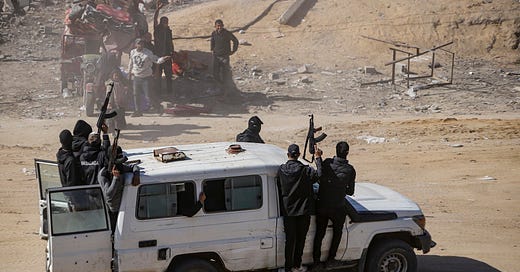Hamas Is on the Ropes—Will “the West” Save It?
The terror group is counting on this last resort.
Cash-strapped Hamas can’t pay fighters as Israeli offensive hits funding sources—report. (The Times of Israel)
A “senior official” of the Israel Defense Forces says Israel is on the way to a “decisive victory” in Gaza.
Military plans indicate that in two months Hamas will control only about 30% of Gaza, down from 40% in recent days. [In the current phase,] the IDF is destroying infrastructure both above and below ground.
The IDF assesses that Hamas
is in severe distress both militarily and civilian-wise. It has lost its command chain and is in a deadlock. Cracks are forming in the population’s dependency on the group, and pressure is mounting—but a full breakdown has not yet occurred. That collapse, they believe, may come through intensified military pressure and control over aid delivery.
Some say Israel can’t afford to keep fighting in Gaza because the situation of the twenty-or-so remaining live hostages is too dire, and Israel urgently has to make a deal for their release. The problem is that according to reports from Doha, Hamas—despite its own dismal situation—keeps stonewalling such a deal.
US envoy Steve Witkoff, who has been pushing hard for a deal in Doha, says: "What I have seen from Hamas is disappointing and completely unacceptable.”
Some in the Israeli security establishment have been saying all along that the hostages are so precious to Hamas as leverage over Israel that Hamas will never agree—unless compelled—to give all of them up.
As the above-quoted senior IDF official put it:
“Hamas will not return all the hostages at once—they’ll play a game and always keep some in their hands.... What drives Hamas to a deal is military pressure— that’s what has brought hostages back so far.”
... Asked what a military victory over Hamas would look like, the official outlined the following phases: destruction of Hamas’s military wing, dismantling of its governing capabilities, capture and retention of territory, and control over humanitarian aid while cutting Hamas off from it.
Hamas is in dire financial straits, too—“the worst...in its history, with government employees in Gaza receiving just 900 shekels (approximately $250) a month for the past four months.”
Thanks to the Israeli pressures, Hamas
is struggling not only to pay civil servants but also members of its military wing, the Izz ad-Din al-Qassam Brigades, and other affiliated institutions....
The Qassam Brigades...have not paid fighters for approximately three months and are facing acute shortages of military supplies....
Administratively, a leadership vacuum has emerged in Gaza’s Hamas-run government.... The group is struggling to fill key roles due to Israel's targeted strikes on anyone perceived to be attempting to restore or facilitate government operations....
The shortage signals a profound organizational dysfunction inside the terrorist group, which is now dealing with renewed fighting and is having difficulty recruiting "fighters" without payment.
Some in Israel have claimed that, with Hamas recruiting new “fighters” and replacing those Israel eliminates, Israel’s renewed offensive since March can’t work. But it turns out that even Hamas, with its jihadist fanaticism, has trouble signing up new troops for free.
By all indications, then, Hamas is on the ropes. Why, then—with Israel offering terms of the exile of Hamas’s remaining leaders and the disarmament of its remaining forces—does Hamas insist instead on keeping up the fight?
Fanaticism is a factor, but there’s likely to be a more rational one: that Hamas counts on Israel’s “allies” to make it call off the campaign.
Indeed, Axios reports: “Israel is losing almost all its allies as it forges on in Gaza.”
This is only part of the rundown that Axios gives:
President Trump and his top aides have signaled to Netanyahu that he should wind down the war and allow in aid, though Trump has mostly kept his concerns private....
The U.K. on Thursday announced it was suspending trade negotiations with Israel....
France is expected to co-host a conference with Saudi Arabia next month to push for a two-state solution, and is expected to formally recognize a Palestinian state.
Spain already recognized a Palestinian state last year, along with Norway and Ireland, and Prime Minister Pedro Sanchez last week labeled Israel a "genocidal state" and called for it to be banned from the Eurovision song contest.
17 of 27 EU foreign ministers backed a motion [last] Tuesday brought by the Netherlands, another key Israeli ally, to reconsider the bloc's trade and cooperation pact with Israel.
Yes, the war is nasty, resulting in civilian casualties and displacement of populations—just as in other urban antiterror warfare waged, for instance, by the US and the UK against ISIS in Mosul and in Raqqa.
The difference is that when Israel engages in such warfare, the world’s major media collaborate unabashedly with the terror group under attack in a propaganda campaign aimed at depicting Israel as the aggressor.
And, that the world’s major democracies quickly fall into line, condemning Israel and trying to force it to desist.
The fact remains that the defeat and dismantlement of Hamas—which appears to be in reach—would constitute a major victory for civilization against barbarism and resonate particularly loudly in the Middle East, alongside offering the best chances for the freeing of as many of the hostages as possible.
Decades of experience indicate that the major European powers—with their elemental opposition to any and all Israeli military campaigns—cannot be convinced of that.
What’s left for Israel is to try to talk sense to the Trump administration—or resist its pressures, and not hand terror a victory.






The IDF needs a KO! 🥊🔔